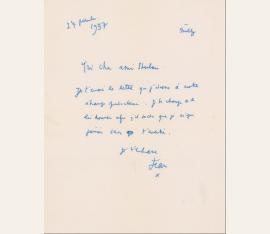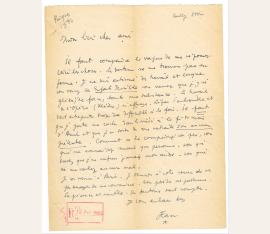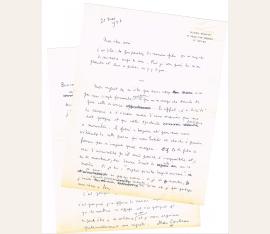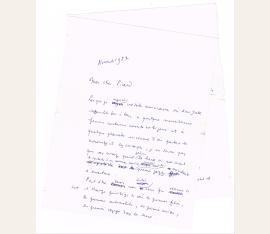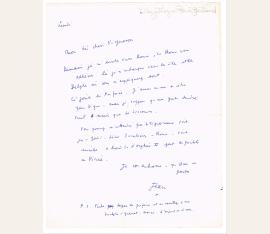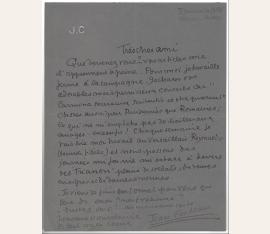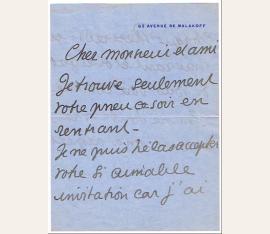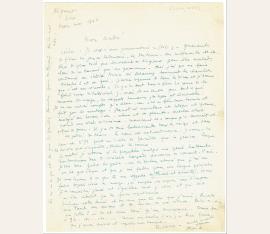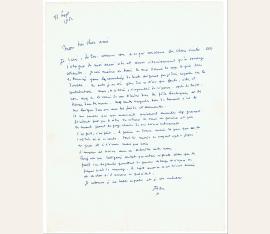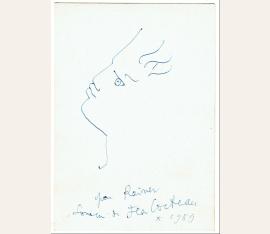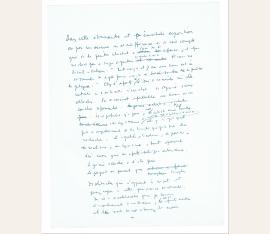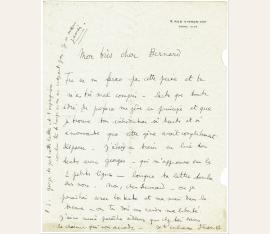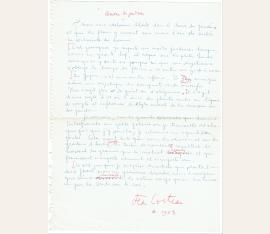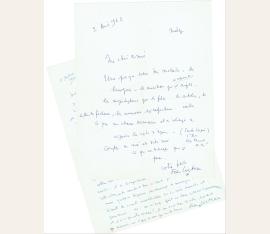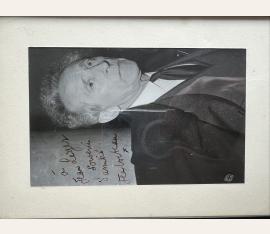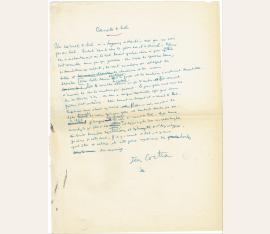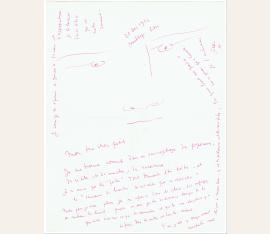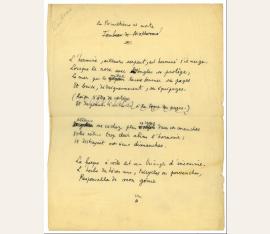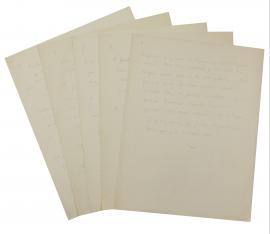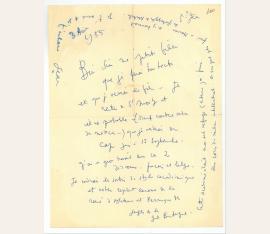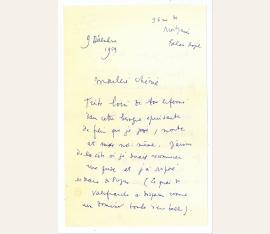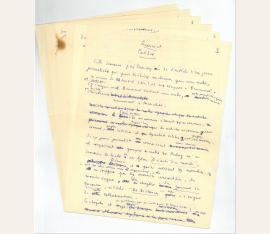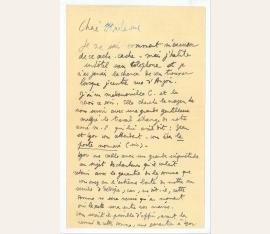Schriftsteller, Regisseur und Maler (1889-1963). Autograph letter signed („Jean Cocteau“). O. O. 1 S. 4to.
$ 449 / 420 €
(1102)
To Jacques Lepage, editor of a literary magazine, in which Cocteau published several articles. Cocteau allows him to publish a text: “[…] Avec mon amitié et mon autorisation de reprendre le texte […]”. – Very decorative.
Schriftsteller, Regisseur und Maler (1889-1963). Signed portrait (“Jean*”). O. O. 180:240 mm. Leichte Gebrauchsspuren.
$ 534 / 500 €
(1924)
Nice head and shoulders photograph of Cocteau that shows him signing an album. With holograph sentiments. Photograph: F. Timpe, Munich.
Schriftsteller, Regisseur und Maler (1889-1963). Eigenh. Brief mit U. Milly-la-Forêt. 1 S. 4to. Mit eh. Umschlag.
$ 534 / 500 €
(24484)
Jean Cocteau (1880-1963), writer. ALS. Milly-la-Forêt, 27. XI. 1957. 1 p. 4to. - With holograph envelope. To a friend: "[…] Je t 'envoi le lettre que j'adresse à notre étrange producteur. Je te charge de lui donner afin qu'il sache que je n'agi jamais sans t'averti […]"
poète, graphiste, dessinateur, dramaturge et cinéaste français (1889-1963). Lettre autographe signée à Herman Van Den Driessche. Milly-la-Forêt. 4to. 1 page. Avec enveloppe.
$ 2,672 / 2.500 €
(54376)
Belle lettre sur la création des « Enfants Terribles » : «Il faut comprendre le vague de mes réponses. Voici les choses. Le docteur ne me trouve pas en forme. Je me suis exténué de travail et lorsque vous verrez les Enfants Terribles vous verrez que j’y ai glissé ; de force, toute ma substance. Le travail de l’opéra (théâtre) m’effraye. Lifar s’embrouille et veut entreprendre trop de difficultés à la fois. Il faut que je parte me cacher dans le midi à la fin du mois d’août et que je ne sorte de ma retraite sous aucun prétexte.
Comment ne le comprendriez vous pas, vous qui me connaissez mieux que personne, vous qui savez que je ne refuse jamais mon aide. Vous qui ne me voulez aucun mal. Je vous verrai à Paris. Je demande à votre cœur de ne pas essayer de me convaincre. Un poète est posthume. Sa présence est inutile. Son fantôme seul compte. Je vous embrasse tous...» « Les Enfants Terribles », roman de 1929, sort en film en 1950 réalisé par Jean-Pierre Melville et adapté par Cocteau..
poète, graphiste, dessinateur, dramaturge et cinéaste français (1889-1963). Lettre autographe signée à Monsieur Harold. 4to. 2 pages sur deux feuillets séparés en-tête « Santo-Sospir, St Jean-Cap-Ferrat ». Avec enveloppe.
$ 2,672 / 2.500 €
(54377)
Belle lettre de Cocteau sur son analyse du cinéma durant le tournage du film « Le Testament d’Orphée » : « C’est hélas la préparation d’un nouveau film qui m’empêche de me rendre auprès de vous. Puis-je vous prier de m’en plaindre et lire à public ces q.q lignes. Mon regret de n’être pas avec vous n’est pas une simple formule de politesse. Ce qui m’en empêche touche de près cette séance. En effet, j’ai décidé de revenir à l’écran mais d’une manière qui me soit propre et que votre spectacle souligne à merveille.
Le film a toujours été pour moi un véhicule de cette poésie qui nous habite et cherche à prendre forme par n’importe quel moyen. Le film a ceci d’admirable qu’il rend possible l’impossible et, en le montant, lui donne droit de cité en ce monde. Si je dis : « Orphée pénètre dans le miroir » - on peut ne pas me croire. Si je le montre, j’imite l’absurdité magnifique des spectacles. On rêve et je fais partager mon rêve à tous. Beaucoup de mes camarades français ou étrangers savent à présent les moindres secrets qui permettent de tourner un film remarquable et, moi-même, j’ai perdu l’innocence d’une époque où ne sachant rien du cinématographe, il me fallait, avec le sang du Poète, inventer le cinématographe à mon usage. Mais sans doute retrouverai-je un domaine très peu lu ne suivant pas la route savante et en recommençant à suivre l’exemple que le sommeil nous donne lorsque le mécanisme génial du songe organise ses intrigues. C’est pourquoi je prépare le Testament d’Orphée. C’est pourquoi je m’efforce de vaincre les obstacles que la routine m’oppose et c’est pourquoi je ne peux être à la Sorbonne ce soir et je vous en exprime fraternellement mes regrets... » « Le Testament d’Orphée », film réalisé par Cocteau en 1959 et sorti en 1960 résume le testament du poète Cocteau..
Schriftsteller, Regisseur und Maler (1889-1963). ALS „Jean Cocteau, member of the U. S. A. Institute of Arts and Letters“. o. O. 4to. 2 SS.
$ 3,740 / 3.500 €
(54428)
To fellow artist Pierre Sicard (1900-1980): „When I was looking at your American paintings where New York in turn looks like some stunning night woman covered with jewels and like some unknown planet that spacecraft and flying saucers fly from, I did not know that long ago you had painted the places where the spectacle of which the first jazz played the overture. Perhaps we shall be soon the ones who received from fate the strange privilege of seeing the first film, the first automobile, the first airplane, the first voyage to the moon.
And you will have been a witness and the historiographer of our somewhat frightening times which will make people smile someday as a kind of 1900 and which, with the passing of time, will appear full of charm. Should you find it amusing to cite the sentences in Cartes Blanches where I saluted the appearances of the black rhythms that currently possess their academy in France, I give you authorization. I could not have guessed then that the anti-academicism of this music would have its own academy and would ask me to be its president.” Central vertical and horizontal folds with small separations at edges, and a few tiny edges tears, otherwise fine condition. Sicard was a French painter in the postimpressionist style, favoring wild and romantic nightlife scenes inspired by the Parisian bars and nightclubs he frequented. He traveled to New York in the 1930s, where he held an exhibition at the Marie Sterner Gallery in 1936; later that year he exhibited his new scenes of New York at Galerie Bignou in Paris. Sicard settled in the US in the 1950s, traveling between New York and Los Angeles, where he continued to create exuberant scenes of the vibrant cities. A wonderful letter in style and content by Cocteau, in which he also mentions his own Carte Blanche, a 1920 critical text in which Cocteau credited jazz with the salvation of modern French music..
Schriftsteller, Regisseur und Maler (1889-1963). Autograph letter signed. o. O. u. D. „Lundi“ [rückseitig 1953]. 4to. 1 Seite.
$ 1,603 / 1.500 €
(59904)
To the egyptologist „cher Vigneron“ René Bertrand, to whom he sends the foreword of his book „Sagesse et Chimeres“. „J'aurais aimé en être plus digne. Mais je suppose qu'un geste tendre vaut mieux que le discours“.
Schriftsteller, Regisseur und Maler (1889-1963). 5 autograph letters signed. 4to u. 8vo. 5 pp. 2 Umschläge.
$ 6,946 / 6.500 €
(60549)
To Jacques Patin, the reviewer for Le Figaro, asking for the address of the hotel where Jules Lemaître is residing, remembering a bullfighting arena („un souvenir des arènes. C'est le rire et le caquet de la jeune Eugénie de MONTIJO [?] rire et caquet qui durent effrayer er ensorceler le timide Napoléon III, le rire et le caquet de toutes les jeunes espagnoles, trépignant avec leurs pieds de bouc et battant de l'éventail pour applaudir un matador qui tue“), mentioning three drawings („1.
Reynaldo en grand 2. Lemaître 3. Ernesta“), asking to reserve himself the right to make necessary corrections, and protesting against editorial revisions of his text („On n'a pas le droit de mutiler un texte et la suite logique d'une pensée. C'est un crime des lettres. Il fallait m'écrire, me téléphoner, me demander conseil. ,Un merveilleux vertige verbal’ je ne peux écrire cela. Pourquoi se substituer à moi?“). Finally, Cocteau is announcing to write one more article, but no further one..
Schriftsteller, Regisseur und Maler (1889-1963). 3 eigenh. Briefe m. U. 4to. 3 pp.
$ 4,809 / 4.500 €
(60550)
An einen Freund. Beschreibung seines Lebens auf dem Land: „Je travaille ferme à la campagne. Je chasse vos adorables mais pernicieux conseils [...] Chaque semaine je vais lire mon travail au Versaillais Reynaldo (dernier fidèle) et nous passons des journées mi fou-rire mi extase à travers des "Trianon" pleins de soldats, de veuves maigres et de dames énormes. Je viens de finir un sonnet pour vous qui sera dans mon "neufvoeuvre"“ - Er beglückwünscht einen ungenannten Freund, der einen Preis gewonnen habe.
Außerdem berichtet er, dass er eine Adaptation von Shakespeares Sommernachtstraum vornehme, die in London einen unvergleichlichen Erfolg habe, und er würde diese Inszenierung gerne mit Musik und französischen Stars übernehmen. Schließlich übt er Kritik an anderen Inszenierungen: "On établirait la réclame sur cette simplification. [...] L'erreur de Guitry c'est d'avoir "refait" Kismet - il avait perdu le climat, la saveur anglaises"..
Schriftsteller, Regisseur und Maler (1889-1963). Sammlung von 5 Autographen (4 eigenh. Briefe mit U., und eine blattfüllende Zeichnung o. U.). o. O. Avenue de Malakoff, Place Sully. 4to und 8vo. 7 pp.
$ 4,809 / 4.500 €
(61495)
An den Grafen René Philipon en 1922. „Vallette édite mon prochain volume […] J’ai peur que Vallette […] ne s’effare de mon livre et surtout d’une nouvelle suite humoristique sur Versailles que vous aimerez!“; „je ne puis hélas accepter votre si aimable invitation car j’ai chaque mercredi un diner familial, navrant et obligatoire – Il est inutile de vous dire comme je regrette !!“; „J’irai vous dire ensuite“ tout le neuf „de mon travail“; „Je commence après 80 jours de lit et de chambre (jaunisse..) à pouvoir écrire. Maman et moi sommes si touchés de votre carte ! Il me reste maintenant à vous plaire avec mon livre“.
franz. Schriftsteller (1889-1963). Eigenh. Brief mit Unterschrift. Hôtel Negresco, Nizza. 4to. 1 p.
$ 1,282 / 1.200 €
(80772)
Der handgeschriebene Brief an „Mon André“, vermutlich den Produzent André Paulvé, mit der Unterschrift „Jean“. Cocteau ist krank: „[…] Voilà : je sors d'une pneumonie - (sic) - quarante de fièvre du jour au lendemain […] Rien de plus triste que l'arrivée au Négresco pour être malade loin de ce travail qui me passionne […]. Cependant, il a pu aller dans les studios où Delannoy tournait ; J'avais organisé de loin les décors et je trouve que c'est une réussite. Il y a de tout dans ce film (à cause de la folie russe de Vakevitch).
Mais il me semble que tout ce qui concerne les visages, les rapports humains, les types, est admirable […]. Jeannot est merveilleux et Sologne et Yvonne, malgré son horreur d'elle-même et ses plaintes. Moulou était d'abord une étoile au cinéma. Maintenant il a compris qu'on tournait et refuse de jouer. Il y a des scènes bouleversantes dans la neige et lle jarddin de Marc. Le nain est extraordinaire. Yvonne, le nain et d'Yd font une drôle de famille qui te plaira. Lorsque les décors sont impossibles, Hubert les sauve […]. Il retourne à la projection sous une pluie battante ; ils tournent dans de grands hangars, etc. […].“ Der Brief befasst sich mit dem Film L’Éternal retour (deutscher Titel: Der ewige Bann), der 1943 unter der Regie von Jean Delannoy und mit einem Drehbuch von Jean Cocteau gedreht wurde. Erwähnt werden in dem Brief zudem Jean Marais, Madeleine Sologne, Yvonne de Bray, Piéral, Jean d’Yd, die in dem Film mitspielen - und der Hund Moulou, der die Rolle des treuen Familienhund hat. Zunächst beschreibt Cocteau seinen Gesundheitszustand: Lungenentzündung, 40 Grad Fieber. Er hadert damit, krank in Négresco angekommen zu sein, wo er seiner Arbeit nachkommen wollte. Er habe aber in die Studios gekonnt, in denen Delannoy dreht und ist zufrieden. Er habe die Sets aus der Ferne organisiert und lobt, was er sieht. „Es gibt alles in diesem Film (wegen Vakevichs russischem Wahnsinn)“. Dann geht Cocteau auf die Charaktere des Films ein. „Jeannot ist wunderbar, genauso Sologne und Yvonne“ - trotz ihres Schreckens über sich selbst und ihre Beschwerden. Dann äußert sich Cocteau über den Hund Moulou, der zuerst der heimliche Star war und jetzt, da gefilmt wird, nicht mehr recht mitmacht. Cocteau ist bewegt von den Szenen im Schnee und in Marcs Garten. Dann schreibt er vom kleinwüchsigen Schauspieler Piéral „er ist außergewöhnlich. Yvonne, der Zwerg und Yd bilden eine lustige Familie, die Ihnen gefallen wird.“ Mit L’Éternel retour hat Cocteau das Motiv von Tristan und Isolde in die Bretagne verlegt. Es geht darin um die Beschwörung einer Welt aus Halbschatten und Träumen. Regisseur war Jean Delannoy, der Produzent André Paulvé. Der Film machte den Hauptdarsteller Jean Marais über Nacht zum Star und zur Muse Cocteaus. Das Lexikon des Internationalen Films schrieb: „Delannoy, für den Jean Cocteau die mythische Geschichte von Tristan und Isolde in die Jetztzeit transponierte, hat, nicht zuletzt mit den hervorragenden Dialogen Cocteaus, einen sehr ernsten, bisweilen schwermütigen Film gedreht, bei dem die Dekors von Georges Wakhevitch und die Musik von Georges Auric eine große dramaturgische Rolle spielen. Thematik und Zwischentöne machen den Film zu einem wichtigen Dokument des französischen Kinos unter der Okkupation 1940 bis 1944.“.
franz. Schriftsteller (1889-1963). Eigenh. Brief mit Unterschrift „Jean“. ohne Ort. 4to. 1 p.
$ 855 / 800 €
(80773)
In dem handgeschriebenen Brief berichtet Jean Cocteau einem „trés cher ami“ von der laufenden Arbeit und die vorhandenen Schwierigkeiten. „[…] Je suis hélas, comme vous, concernant la chose écrite. Elle s'éloigne de moi aussi vite et aussi silencieusement qu'une soucoupe volante. Je suis même en train de me donner des coups de pied dans le derrière pour les corrections de texte original que je dois reporter […]. En outre je ne vois plus dans ce livre que fautes, vides et contradictions […].
Il me semble que nos manuscrits arriveront ensemble chez Grasset. Je redoute fort que le vôtre ne réduise le mien en poudre et que les savants fassent des gorges chaudes de ma science artisanale […].“ Cocteau schreibt, ihm gehe es wie dem Adressaten in Bezug auf den nicht näher erläuterten Sachverhalt. „Sie entfernt sich so schnell und leise von mir wie eine fliegende Untertasse.“ Er verschiebe dafür sogar die Textkorrekturen. Cocteau äußert sich, viele Fehler, Lücken und Widersprüche in dem nicht näher genannten Buch zu erkennen und spekuliert, dass die Bücher (seines und vermutlich das des Briefempfängers), zur gleichen Zeit bei dem von Bernard Grasset (1881-1955) betriebenen Verlag Éditions Grasset & Fasquelle ankommen werden. Cocteau äußert die Befürchtung, dass die Wissenschaftler über seine handwerkliche Arbeit herziehen werden. Cocteau betrachtete seine Arbeit als Handwerk, wie auch die Wochenzeitschrift „Die Zeit“ 1952 anlässlich eines Besuchs des Künstlers in Hamburg beschreibt: „Cocteau, der Romantiker, der zugleich der Mann der Theaterpraxis ist, der „artisan“, der sein Werk aus seiner Hände Arbeit entstehen läßt („Mein Kopf ist dumm“, sagt Cocteau), der alle Formen der Kunst erprobt, und der wie kein anderer ein Gefühl für die Bedürfnisse des breiten Publikums hat, ist auch der erste gewesen, der die universelle Bedeutung des Films als eines „Vehikels der Poesie“, als einer echten mythenbildenden künstlerischen Ausdrucksform erkannt hat. Denn im gleichen Sinne wie sein Theater will auch sein Film an das Herz des großen Publikums klopfen; er will – wenn auch unter Beibehaltung der „Falle“ – wahre Volkskunst werden. „Erst vierzehn Tage nach der Uraufführung eines Werkes erreicht man das wirkliche Publikum“, meint Cocteau. „Dieses Publikum gewinnt man in dem Augenblick, wo sich, wie im ‚Doppeladler‘, Jean Marais in der Schußlinie Edwige Feuilleres befindet und die Leute im Saale rufen (ich habe sie selbst gehört): „Vorsicht, pass auf!““ Trotz seiner Leistungen auf fast allen literarischen und künstlerischen Gebieten bestand Cocteau darauf, in erster Linie ein Dichter zu sein. Er nannte seine sämtlichen Werke Poesie. Eines seiner berühmten Zitate war der Spruch: „Gute Erziehung besteht darin, zu verbergen, wie sehr man sich selbst schätzt und wie wenig die anderen.“.
frz. Dichter, Maler, Filmemacher (1889-1963). Eigenh. Albumblatt mit Zeichnung und Unterschrift. ohne Ort. 8vo. 1 p.
$ 1,336 / 1.250 €
(81857)
„Pour Rainer Souvenir de Jean Cocteau“. Beiliegend Brief von fremder Hand an jenen Rainer aus 2008 auf Doppelkarte mit gedruckter farb. Zeichnung Cocteaus ("Le tango");
frz. Dichter, Maler, Filmemacher (1889-1963). Eigenhändiges Manuskript ohne Unterschrift. ohne Ort und Datum. 4to. 1 p.
$ 1,282 / 1.200 €
(83452)
Rezension einer Ausstellung von Gemälden von Kindern. Cocteau erinnert sich an einen Satz, den Picasso zu ihm gesagt hatte. „Chez l'enfant ni l'idée de réussite ni le contrôle ... n'existent ... Son inconscient infaillible ne traverse aucune couche déformante ... L'équilibre, la couleur, la poésie, le réalisme, le lyrisme, tout pousse ici sans que la néfaste intelligence intervienne. Le génie éclate à l'état pur“.
frz. Dichter, Maler, Filmemacher (1889-1963). 2 eigenhändige Briefe mit Unterschrift “Jean “. ohne Ort. 4to. 2 pp. 1 Brief gelocht. 1 Brief mit kleinen Ausrissen am rechten Rand.
$ 1,336 / 1.250 €
(83923)
An den französischen Verleger Bernard Grasset (1881–1955). [1931?]: „Tu ne me feras pas cette peine et tu m’as très mal compris. Sache que toute idée de préface me gêne en principe et que je trouve ton introduction si haute et si émouvante que cette gêne avait complètement disparu. […] Non, cher Bernard – ou je paraîtrai avec ton texte et ma main dans la tienne – ou tu dois me rendre ma liberté. J’aime mieux paraître ailleurs que chez toi sans la chaleur qui nous accorde.
[…] Je ne mens jamais. […]“ II. ohne Ort. 1940. „[…] Tes secrétaires André F[raigneau] et Chateaubriant t’ont peut-être raconté que je sortais d’une clinique très pénible – d’où mon espèce de disparition. J’ai lu ton livre [à la recherche de la France] que je trouve d’une importance extrême et qui, seul, s’oppose à tant de désordres. J’aurais voulu te le dire et en parler avec toi […]“.
frz. Dichter, Maler, Filmemacher (1889-1963). Manuskript von dritter Hand mit eigenh. Titel, Korrekturen und Unterschrift. ohne Ort. Folio. 1 p. Ausriss aus Spiralheftung.
$ 641 / 600 €
(83924)
Der Text von Cocteau diktiert, die Korrekturen und eigenh. Unterschrift von Cocteau mit rotem Kugelschreiber. „J’aime une certaine liberté dans le décor des jardins et que les fleurs y vivent sans avoir l’air de subir la contrainte des hommes. C’est pourquoi je respecte un maître jardinier lorsque, comme un grand chef, il règne sur les plates-bandes sans qu’on y sente sa poigne ni que son despotisme n’oblige la troupe des fleurs à se mettre au garde à vous »… Il évoque les jardins japonais, et un autre, qui fleurit au hasard à Villefranche, et conclut : « Ce n’est pas que je méprise les artistes qui plantent un décor floral, mais un gracieux désordre nous enseigne que même obéissante, la nature exige qu’on lui laisse un peu la bride sur le cou.“.
frz. Dichter, Maler, Filmemacher (1889-1963). 2 eigenhändige Briefe mit Unterschrift. 4to. 2 pp.
$ 1,058 / 990 €
(83925)
An einen Freund: 2. April 1960: „Une presque sœur très malade, les besognes, les auditions pour la reprise de L’Aigle, les magnétophones pour le film, les articles, les lettres, les fâcheux, les aumônes, les refacheux. Voilà ce qui me chasse demain et m’oblige à rejoindre la Côte d’Azur […]“ - 5. Juli 1960. „[…] souffler un simulacre de 71 bougies. [….] Les lettres m’ont presque procuré de la gêne, tellement d’un seul coup elles nous plongent dans un fleuve de sang et d’encre très doux et très calme entre des rives que je connais bien et qui s’y reflètent à l’envers.
Charles s’y montre sans masque de théâtre avec toute sa noblesse et sa gentillesse et cette enfance dont il avait les colères (je le revois encore lancer une boîte de pastilles de Vichy qui éclatait comme une bombe). Et ce que j’aime c’est qu’il trouve le temps d’écrire de vraies lettres dans cette épouvantable époque de hâte, de téléphone et de radio. […] cette étonnante courbe de dos n’était point une bosse mais quelque bizarre instrument de musique dont il tirait des accents inoubliables de sa voix nasale et passionnée. Ah ! vous m’avez fait un beau cadeau d’anniversaire […]“.
frz. Dichter, Maler, Filmemacher (1889-1963). Portraitphotographie mit eigenh. Unterschrift auf der Bildseite. ohne Ort und Datum. 100 : 150 mm.
$ 1,282 / 1.200 €
(93325)
Hübsches, unter Glas gerahmtes Originalphotographie, die den Autor im Halbprofil zeigt. Die Widmung „À Jean Lèger souvenir s’amitié Jean Cocteau *“.
poet, painter and playwright (1889-1963). Group of 10 Autograph Manuscripts. no place. Together 11 pages, 4to or folio, written on rectos of separate sheets, few on verso of abandoned drawing fragment or letter to him; few with an irregular edge, folds.
$ 6,946 / 6.500 €
(93445)
A collection of 10 precious manuscripts from 1940s, including 5 signed, brief or fragmentary working drafts of reviews for books or films and notes for longer works intended for magazines or other publications, in French, some with title in holograph. "Dance Card": "A dance card has always enchanted me, I, who do not go to balls. Enchanted in the strictest meaning of the term. Enclosed in an enchantment where the ball becomes something to which a real ball must resemble as little as possible. A kind of hurricane, therefore, a whirlwind in slow motion.
. . . " [Film review]: "Such a Pretty Little Beach is one of the first French films that opposes heroically the dire industrialization of cinematography. By its relentless mechanism, by the photography where [cinematographer Henri] Alekan effaces work by dint of science, by the high cage of rain where Gérard Philipe casts his marvelous wounded bird face, the film of Yves Allégret deserves that the public renounce the idea that it forms of a film, and proceeds to read the film like a book." "Le Potomak": "A prediction before the war, an image of malaise, of youth in search of its way, a preface to the entire works of Jean Cocteau. . . ." "Olivier Larronde": "Olivier Larronde never yielded to any fashion, to any politeness. He understood, in a single blink of an eye, that the worst fashion was the one that doesn't think it is one and opposes fashions. This very young poet writes, with a diamond stylus, on the window pane against which the youth of 1947 moan or rebel. . . ." "Elegance and Fashion": "Elegance is not fashion. One is accustomed to confusing them. Elegance is an innate way of having fashion serve a particular allure that individualizes it and gives it a style resembling that of the human body. One sees that the form of the body itself changes with fashion, that shoulders widen or shrink, that the hips are accentuated or flattened . . . . "Fashion is insolent, haughty, rapid. It dies quickly. . . . It passes. It shows contempt. It crushes. . . ." "At the Home of Belgian Friends": "There is a Beauty and there is a beast. Beauty is a little country girl disguised as a princess. The Beast is a Prince Charming transformed into a beast. There's a family that lives in a house where the style of Vermeer reigns. . . . There is the word of Paul Eluard, whom one asks what he thinks of this film and who answers: to understand this film, one must love one's dog more than one's car. There are people who judge works and works that judge people. . . . There is Jean Cocteau who comes to address him [Eluard] and who greets him." [On Indian art]: "One of my friends sent from the temples of India photographs of sculpture too high and too distant to be seen with the naked eye. This work results in a magnificence so grave and so lively, an enigma so noble, that I invoke them when the question of liberty arises. . . . I bow before races where the slightest gesture signifies. I bow before the ceremonial of the profound Indies." "Hello from Paris": "Pretty, graceful, charming, adorable, light, tender; all of these terms are reduced by innumerable use, one would . . . restore them anew to apply them to Vertès like a white robe. . . . "Vertès could have descended the slope of success and gotten drunk there from vertigo. He hasn't done that. He kept his control and preserved his line. . . . "Greetings, Vertès, on your return from America. Hello from Paris.".
poet, painter and playwright (1889-1963). Autograph letter signed with a drawing in Cocteau’s hand. Milly soir. 4to. 1 p.
$ 2,672 / 2.500 €
(93458)
„Je me trouve comme dans un sarcophage de paperasses, de visites, de démarches, de vacarme. Je n'aime pas les ,fêtes’ tout devrait être fête - et la ,semaine de bonté’ n'est-elle pas un scandale? Mais plus je vais plus je m'enfonce dans le silence […]“ Translated: "I feel like I'm in a sarcophagus of paperwork, visits, procedures, and noise. I don't like 'celebrations'; everything should be a celebration - and isn't the 'week of kindness' a scandal? But the more I go on, the more I sink into silence [...]"
Schriftsteller, Regisseur und Maler (1889-1963). Autograph letter signed and autograph manuscript signed. Le Lavandou. 02.07.1922. Zusammen (1+1 =) 2 SS. auf 2 Bll. Gr.-4to.
$ 1,603 / 1.500 €
(41006/BN21488)
To an unnamed addressee, probably the editor of a magazine: "Je n'ai rien sauf ce sonnet que je vous envoie en témoignage de bonne chance pour votre revue. […] Ci joint un dessin de Picasso, faites le clicher et retournez le moi. En voici la légende: Jean Cocteau et M. Chabelska, créatrice de la petite fille américaine dans Parade. (Rome 1916). Caricature de Picasso [...]". - On the lower left edge of the recto-page Cocteau notes probably with reference to the enclosed sonnet "Métamorphoses": "il est probable qu'on se moquera partout de 'petites bottines' - Publicité à l'œil que je vous offre".
- From the enclosed sonnet: "Beauté, capable, si votre jeunesse plonge, | De s'élargir comme un objet de caoutchouc, | Pour, assouplie après ce système de songe, |apparaître au soleil, intacte, tout à coup […] Le serpent des couleurs accroche aux églantines | Sa cravate, ses gants, ses petites bottines; | Et de lui même sort un reptile têtu [...]". - In ink on very thin paper; both leaves with with strong defects to edges and somewhat browned; the letter with punched holes in the left margin (no loss to text); here and there some small notes from an old hand..
French artist (1889-1963). Autograph letter signed. N. p. 14.10.1954. 4to. 1 p.
$ 1,603 / 1.500 €
(49460/BN33854)
To an unnamed recipient about the use of enjambment in verse texts: "Mon cher ami, Cet enjambement tombe sous le sens et je l’employais jadis à l’époque de 'Secret Professional'. Je ne savais pas que vous l’avez employé et je vous en félicite […]. (Je l’ai employé aussi une ou deux fois dans le chapitre 7 […]).[…] Melle [?] (qui est à la radio) a eu la palme comme de juste. Je n’y étais pour rien. Les roues de la radio et de la télévision sont étranges. On va annoncer le chaos, décision prise. Votre fidèle Jean Cocteau".
poète, graphiste, dessinateur, dramaturge et cinéaste français (1889-1963). "La mort". Autograph poem. S. l. Au recto d'un feuillet. In 4°.
$ 4,809 / 4.500 €
(49683/BN34153)
This wonderful poem was composed in memory of the young deceased French novelist and poet Raymond Radiguet, whose mentor Cocteau was.
poète, graphiste, dessinateur, dramaturge et cinéaste français (1889-1963). "La Pénultième est morte". Poème autographe. S. l. Au recto d'un feuillet. In 4°.
$ 4,809 / 4.500 €
(49684/BN34154)
The present poem is a tribute to Mallarmé, and shows some some deviations in comparison to the published text in "Poèmes épars (1945-1963)", including the full title "La Pénultième est morte/Tombeau de Mallarmé".
French artist (1889-1963). Autograph letter signed ("Jean"). No place. 4to. 2 pages.
$ 4,809 / 4.500 €
(80945/BN52871)
Beautiful and moving letter to his friend Max Jacob. Exhausted by the treatment, Cocteau begins the letter by apologizing to his friend: "Pardonne moi d'écrire si mal & des choses si bêtes - c'est le premier [sic!] lettre permis par le médecin et je n'ai aucune force. Je ne peux encore aller du lit à la table, mais mon chéri, mon pauvre enfant merveilleux tu ne comprendras donc jamais que ‘mes silences' sur tes poèmes n'ont aucune signification de blâme - que la moindre boucle d'une de tes lettres a déjà du prestige pour mes yeux et mon coeur - que je t'approuve d'avance comme faisaient les admiratrices de Sarah Bernhardt [...] Depuis avant-hier je suis hors de danger - alors le médecin ne m'écoute même plus et me laisse avec une tulle de nerfs autour du poumon gauche et des aigrettes atroces [...] Très heureux d'Hugnet libéré du service [...] Mon Max je t'aime.
Ton amitié, ta bonté pour mon oeuvre sont toute ma récompense. Je t'embrasse, Jean" (transl.: "Forgive me for writing so badly & such silly things - this is the first letter allowed by the doctor and I have no strength. I cannot yet go from bed to table, but my darling, my poor, wonderful child, you will never understand that 'my silences' on your poems have no blame significance - that the slightest loop of one of your letters has already prestige for my eyes and my heart - that I approve of you in advance as did the admirers of Sarah Bernhardt [...] Since the day before yesterday I am out of danger - so the doctor doesn't even listen to me anymore and leaves me with a tulle of nerves around my left lung and atrocious regrets [...] Very happy about Hugnet being released from the service [...] My Max, I love you. Your friendship, your kindness for my work are all my reward. I embrace you, Jean")..
French artist (1889-1963). "La poësie". Autograph manuscript. No place or date. 4to. 4½ pages on 5 ff. In pencil.
$ 4,809 / 4.500 €
(80947/BN52873)
Charming reflections, in French, on the essence of poetry: "La poësie si j'osais la définir serait l'élégance même. est donc normal qu'elle joue de la plus petite chose à la plus grande - mais grande ou petite la chose devient souvient invisible lorsque la poësie l'habite [...] faut croire que ce monde pris naissance dans un certain désordre qui devint notre ordre et en quelques sorte notre style personnel [...] J'ai remarqué que je prenais le style du personnage que je joue, dans la vie, non pas que je me pousse dans ce sens pour me donner le réalisme qui est à la base de toute poësie.
C'est celui qui me permettrait de montrer au jour tous les défauts que j'ai essayé de tirer de moi. J'aimerais presque toujours jouer des rôles qui ne sont pas pour moi... Les êtres anti-poëtiques sont les êtres qui veulent écrire le langage poëtique. Le cinéma permet de dépasser les frontières humaines, comme le prouve 'orphée' parce qu'il nous montre de qui l'écriture ou l'imagination nous offre de nous [...] La poësie est une haute élégance morale. Oui la poësie est lente et nous jugeons parfois trop vite. La lumière des poëtes est aussi longue à vous arriver que celle des étoiles [...] notre époque ou la poësie se cache de plus en plus et se montre sans cesse là où on ne croyait pas l'attendre. Le comble de la poësie c'est de n'avoir pas 'l'air poëtique'. L'artisanat est la poësie même. J'aime rendre réalisable l'irréalisable. Ce qui me donne le plus de courage mais hélas on ne fait pas ce qu'on veut. La définition de moi-même: le travail et le désir de plaire aux quelques personnes qui comptent à mes yeux" (transl.: "Poetry, if I dared to define it, would be elegance itself. It is therefore normal that it plays from the smallest to the largest thing - but large or small the thing becomes invisible memory when poetry inhabits it [...] I have noticed that I take the style of the character I play in life, not that I push myself in that direction to give myself the realism that is the basis of all poetry. It's the one that would allow me to show in the daylight all the flaws I tried to draw from myself. I would almost always like to play roles that are not for me [...] Anti-poetic beings are those who want to write the language of poetry. Cinema makes it possible to transcend human limits, as 'Orpheus' attests, showing us what writing and imagination have to offer us. [...] Poetry is a high moral elegance. Yes, poetry is slow and we sometimes judge too quickly. The light of the poets is as long to come to you as the light of the stars [...] our age in which poetry is increasingly hidden and is constantly showing itself where we thought it was not expected. The height of poetry is not to 'look poetic'. Craftsmanship is poetry itself. I like to make the unattainable realizable. That gives me the most courage, but alas, we do not do what we want. The definition of myself: work and the desire to please the few people that matter to me")..
French artist (1889-1963). Autograph letter signed. No place. 03.08.1955. 4to. 1 p.
$ 1,047 / 980 €
(82846/BN54214)
Written in the year he was made a member of the Académie française and of the Royal Academy of Belgium: "Bien sure ma petite fille que je ferai ton texte et que je verrai le film - je rentre à St. Moritz et il est probable (sauf ordre du médecin) que je resterai au Cap [i.e. Saint-Jean-Cap-Ferrat] jusqu'à 15 Septembre. J'ai eu gros travail avec ces 2 discours; français et belge [...]". - Traces of folds, otherwise in excellent condition.
French writer and artist (1889-1963). Autograph letter signed ("Jean"). 36 rue de Montpensier, Palais-Royal [Paris]. 09.12.1959. 8vo. 2 pp.
$ 3,740 / 3.500 €
(83058/BN54492)
To the German-born actress and singer Marlene Dietrich about the exhausting work on his film "Le Testament d'Orphée" (1960), discussing filming at Saint-Maurice the following day, his return from the Côte d'Azur, where he also filmed a scene and found the Quai de Villefranche in Fréjus had disappeared. He also mentions fond memories of her sitting beside him in a showing of his 1946 film "La Belle et la Bête", writing that he is happy to see her beloved by simple people, and that the higher one climbs the social ladder, the less kindness one meets: "Triste loin de toi enfermé dans cette besogne épuisante du film que je joue, monte et mixe moi-même.
J'arrive de la côte où je devais recommencer une prise et j'ai respiré le drame de Fréjus. (Le quai de Villefranche a disparu comme un domino tombe d'un table). Demain je tourne encore à Saint Maurice [...] et chaque fois que j'entre dans la salle du projection je pense à toi, amie auprès de moi pour la Belle et le Bête. Je suis profondément heureux de ton succès et de te savoir aimée par les simples - car plus on monte dans l'échelle sociale moins on rencontre de gentillesse [...]". - Small brownstain..
French artist (1889-1963). Autograph letter signed. Saint-Jean-Cap-Ferrat. 17.04.1958. 4to. 1 p. With autograph envelope.
$ 1,603 / 1.500 €
(84219/BN54688)
To the literary scholar Michael Smithies, concerning Cocteau's autobiographic novel "La Difficulté d'être" and a possible translation. Apparently Smithies had criticized the preface for being "more mysterious than the book"; Cocteau agrees and suggests a translation with a preface by the translator "who would know better than I how to show the importance and gravity of the book": "Je suis heureux de trouver votre bonne lettre à mon retour de Rome. La Préface de la Difficulté d'être est en effet plus mysterieuse que le livre et vous avez raison.
Peut être pourrait on le traduire et y joindre une préface du traducteur qui saurait mieux que moi montre l'importance et la gravité du livre [...]". - The first English translation of the novel was published in 1967, four years after Cocteau's death, with a preface by the composer Ned Rorem. - On stationery with letterhead of the villa "Santo Sospir" in Saint-Jean-Cap-Ferrat. Well preserved..
French artist (1889-1963). "Science et Poésie". Autograph manuscript signed. N. p. 4to. 4½ pp. on 6 ff. In French.
$ 4,809 / 4.500 €
(86131/BN57042)
Highly interesting manuscript for an article written in response to criticism of Cocteau’s collaboration with the Saclay Nuclear Research. Cocteau had been asked by the research centre to provide the text for the voice-over commentary of the 1956 documentary short "À l’aube d’un nouveau monde" on nuclear energy. This was preceded by Cocteau’s 1953 publication "Journal d’un inconnu" with a chapter entitled "Des Distances" on his notion of space that had convinced the scientists at Saclay of Cocteau's potential as a science communicator.
The manuscript opens with the remark that he had to "laugh a lot" about the "article by a young journalist who believes nuclear research to be a fashion" and who compared Cocteau to the legendary dandy Beau Brummell for following this apparent fad. Cocteau argues that nuclear research began with the Greek philosopher Heraclitus and accuses the journalist of not knowing his work, pointing to his "Journal d’un inconnu" as the origin of the collaboration. He compares science and poetry to organisms "that will not suffer the smallest inexactness, the smallest vagueness" and goes on to defend the opening phrase of the voice-over, "Few scientists master the use of the word", that had apparently been misunderstood as an insult. For Cocteau, the "privilege of the poet consists in making the abstract concrete, in defining the invisible, to procure it with volume and outlines, in short, to become the interpreter of scientists". Although he mentions Henri Bergson and Henri Poincaré as exceptions to the rule, Cocteau insists that scientists "are more comfortable with algebraic formulae than with those of syntax". At the same time, he stresses that "his formulas" for the film "are the opposite of the 'poetic' style", comparing his text to a simple attempt "to make a stroll among machines of mysterious use less unpleasant". He underlines that he was not allowed to employ "the slightest bit of imagination", which he "detests", but that he also had to "evade the bleak platitudes of guidebooks". It is arguable whether a simile like the following is devoid of imagination: “with pastoral innocence nature employs the method of Poe’s Purloined Letter to dissimulate the most formidable secrets". The theme of dissimulation continues in the second half of the text, when Cocteau conceives "the Sphinx of atomism" and compares the Geiger counter to a truffle pig. Cocteau closes with thanks to the scientists at Saclay. - 5 pages are numbered 1 through 4, with an annex to page 2. An unnumbered leaf with the autograph designation "Monsieur Louis Aragon" suggests that the text was supposed to be published in Aragon’s literary weekly "Les Lettres françaises". Several cancellations and changes by Cocteau's hand. Minimal stains and tears. A minor tear due to fire damage on page 3 restored with adhesive tape..
French artist (1889-1963). 2 autograph letters signed. "10 rue d'Anjou" [Paris] and n. p. 8vo. and 4to. Together 3 pp.
$ 6,946 / 6.500 €
(91559/BN60880)
Both to the Franco-American patron, socialite, and artist Winnaretta Singer, Princesse Edmond de Polignac, the highly interesting longer letter concerning her sponsorship of Igor Stravinsky's and Jean Cocteau's opera "Oedipus Rex". Cocteau reports that he had met a "Mademoiselle C", apparently a kind of liaison between Singer and the two artists, but criticizes the "strange work" of "M. S.", apparently Stravinsky, who had referred to Singer as "the purse" in front of the Mademoiselle. Furthermore, Cocteau calls Stravinsky "unstable and a child of melodrama and timidity", lamenting that he has to "take care of everything" himself in spite of not having "any habit of business affairs, even on friendly terms".
Despite these grievances, Cocteau asks Singer for a further financial guarantee that should allow Stravinsky to hire the singers that he wants for the premiere, invoking Stravinsky's urgent messages, his anxiety, and Singer's friendship. The letter in full: "Je ne sais comment m'excuser de ce cache-cache, mais j'habite un hôtel sans téléphone et je n'ai jamais la chance de vous trouver lorsque je rentre rue d'Anjou. J'ai vu mademoiselle C. et la revois ce soir. Elle cherche le moyen de nous servir avec une grande gentillesse malgré le travail étrange de notre ami. M. S. qui lui avait dit : Jean et Igor vous attendent-vous êtes le porte-monnaie (sic). Igor me câble avec une grande inquiétude au sujet des chanteurs qu'il voulait retenir avec la garantie de la somme que vous avec eu l'extrême bonté de mettre au service d'Œdipe, car, me dit-il, cette somme ne sera versée qu'au moment où le reste sera entre nos mains. Vous serait-il possible d'offrir, avant la remise de cette somme, une garantie à Igor lui permettant d'engager sa troupe ? - Cet homme que je croyais labile et un enfant de mélodrame et de timidité, il me charge de tout et je n'ai aucune habitude des affaires, même amicales. Je me permets d'intervenir, uniquement à cause de ses dépêches, de son angoisse (sic) et de l'amitié que je vous sais avoir pour lui et pour son œuvre. Croyez-moi, chère Princesse, votre ami respectueux [...]". - Stravinsky had asked Cocteau to collaborate on "Oedipus Rex" after he had been impressed by Cocteau's adaptation of "Antigone" in 1925. Cocteau's libretto was translated into Latin by Jean Danéliou according to Stravinsky's wishes. With Winnaretta Singer's financial support, the piece could be premiered as a concert on 30 May 1927 in Paris. The first stage performance as an opera would follow on 23 February 1928 at the Vienna State Opera. "Oedipus Rex" is considered one of the finest works of Stravinsky's neoclassical period. - The shorter letter is less specific, Cocteau informing the recipient that he is still recovering from an illness but hopes to be able to see her within a few weeks: "Vous savez que je viens d'être bien malade et il faut encore que je prenne garde. On m'enferme le soir [...]. Je serais heureux de vous voir et de vous entendre. Je pense reprendre un rythme normal dans quelques semaines". - Beyond Singer's patronage for "Oedipus Rex", Jean Cocteau was a frequent guest of her famous Paris salon. - Both with minimal tears and minimally creased..
poet, painter and playwright (1889-1963). "Le mystère de Jean l'oiseleur". Printed manuscript with 6 autograph lines signed. No place. 4to. 21 pp. on 22 ff. Phototype with handwritten pagination 1-28 (instead of 36, lacking pp. 5, 6, 8-10, 12, 16, 18, and 21) and 16 (instead of 31) portrait illustrations, of which all are nearly full-page. Partly handcoloured in pastel and pencil by the .
$ 1,603 / 1.500 €
(91750/BN61074)
To a Maurice, writing that Cocteau's handwriting here looks faked, which would not express the gratitude he truly feels: "La dessus mon écriture à l'air d'un faux, ce qui ne convient pas pour exprimer ma reconnaissance affectueuse, mon cher Maurice [...]". - "Le mystère de Jean l'oiseleur", a series of 31 self-portraits including short poetic reflections in the margins, was originally mostly created under the influence of opium, during a melancholic retreat after the death of his friend Raymond Radiguet in a hotel called "Welcome" in Villefranche in 1924. - Wrappers slightly browned, fingerstained and with tears in the fold.
sold
Eigenh. Brief mit U. („Jean“) und einer kleinen Handzeichnung.
Autograph ist nicht mehr verfügbar
Letter to Mary Calloway, telling her that he is completely exhausted, standing in front of a table with pastel pencils covering him from toe to head; regrets that Matisse has passed away a few days ago, and that he will attend his mortuary. „Colette has just left us, now Matisse. Who’s next? [...]“ (transl.). – At the top of the front of the letter, Cocteau has added a blue pencil sketch of a female’s face, a fluffy cloud, and several stars. – In fine condition, with some scattered light creases and wrinkles.
Autograph letter signed.
Autograph ist nicht mehr verfügbar



